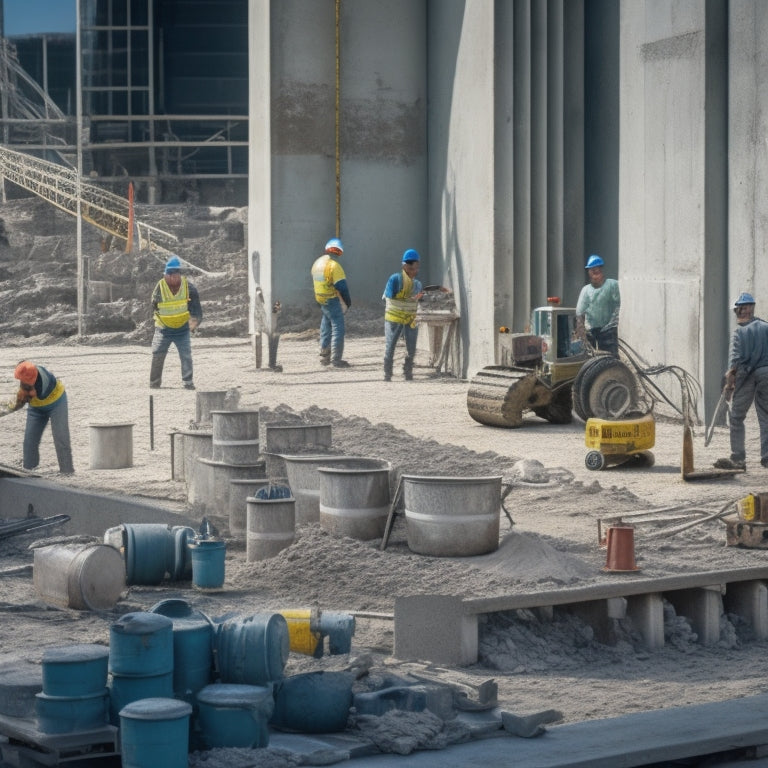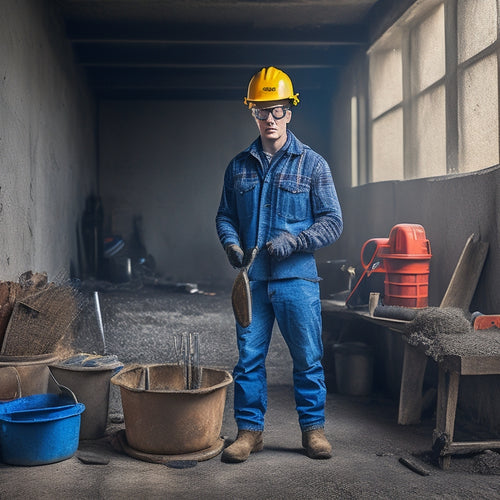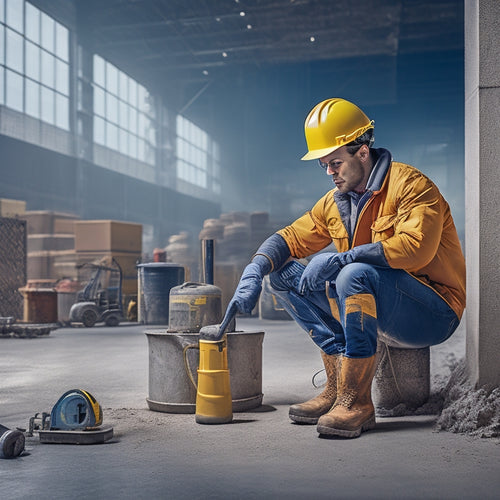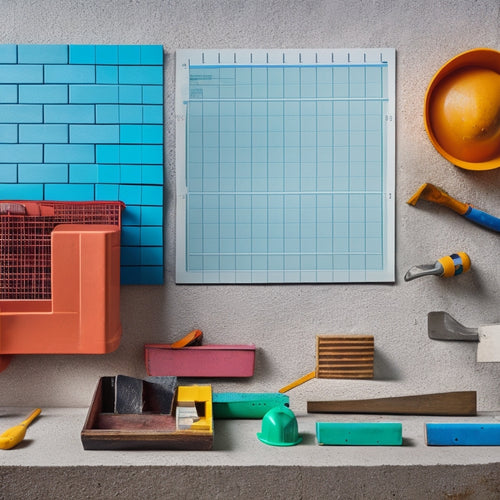
Renting Tools for Concrete Masonry Construction Projects
Share
You're likely to spend up to 70% of your concrete masonry construction project's budget on labor costs, but with the right tools, you can greatly reduce that expense and increase productivity. Renting essential tools such as cinder block work equipment, block cutting machinery, mixing and pouring machines, and leveling and aligning devices can streamline your workflow. Additionally, investing in safety gear, compaction and tamping tools, material handling equipment, and power tool rentals can further enhance efficiency. By understanding the importance of each tool, you'll be able to allocate your budget effectively and make informed decisions to guarantee your project's success - and there's more to explore in optimizing your concrete masonry construction project.
Key Takeaways
• Renting specialized tools for concrete masonry construction projects can enhance efficiency and reduce costs.
• A mix of general and specialized tools, including levels, trowels, and jointers, are essential for cinder block work.
• The right cutting equipment, such as masonry saws or diamond blade saws, is crucial for customizing cinder block sizes.
• Leveling and aligning devices, like laser leveling equipment and precision alignment tools, ensure perfect level and alignment.
• Renting material handling equipment, such as forklifts and pallet jacks, can streamline workflow and reduce labor costs.
Essential Cinder Block Tools
You'll need a mix of specialized and general-purpose tools to successfully work with cinder blocks, including a level, trowel, jointer, and hammer. These essential tools will help you achieve professional results in various cinder block applications, such as building walls, foundations, and decorative features.
One of the significant cinder block advantages is its versatility, allowing you to create unique structures and designs. When working with cinder blocks, it's vital to guarantee accurate leveling and alignment. A level will help you achieve this, while a trowel is necessary for applying and smoothing mortar.
A jointer is used to finish and joint the blocks, and a hammer is essential for tapping them into place. Additionally, you may need other general-purpose tools, such as a tape measure, safety glasses, and a wheelbarrow, to complete your project efficiently.
Block Cutting Equipment Options
When it comes to customizing cinder block sizes or creating complex designs, having the right block cutting equipment is essential to efficiently and accurately cut blocks to fit your project's specifications.
You'll need to take into account the type of cuts you need to make, the frequency of use, and the level of precision required. For instance, a masonry saw or a block cutter can be used for straight cuts, while a diamond blade saw is better suited for curved cuts or intricate designs.
When selecting block cutting equipment, don't compromise on block cutting safety. Verify the equipment you rent is well-maintained, and that you're familiar with the operating procedures and safety guidelines.
You should also invest in personal protective equipment, such as gloves, safety glasses, and a dust mask, to prevent injuries and exposure to dust and debris.
Mixing and Pouring Machines
Efficient concrete masonry projects rely on mixing and pouring machines that can handle high volumes of concrete with precision and speed. As you plan your project, you'll need to take into account the right equipment to guarantee a smooth and efficient process. Mixing and pouring machines are essential for achieving consistent results and meeting tight deadlines.
When selecting a mixing machine, think about the following factors:
-
Capacity: Choose a mixer that can handle the volume of concrete required for your project.
-
Mixing techniques: Opt for a machine that can accommodate your preferred mixing technique, whether it's rotary drum, pan, or twin-shaft mixing.
-
Pouring methods: Consider a machine that can adapt to your pouring method, such as pumping, conveyor belts, or bucket placement.
Leveling and Aligning Devices
When you're working on a concrete masonry project, you'll need to guarantee that your walls, floors, and other structures are perfectly level and aligned.
To achieve this, you'll require specialized tools that provide accurate readings and precise adjustments.
You'll want to rent laser leveling equipment and precision alignment tools to get the job done efficiently and effectively.
Laser Leveling Equipment
You'll find laser leveling equipment, such as rotary lasers and line lasers, essential for achieving precise leveling and alignment in concrete masonry projects. These tools have revolutionized the industry with their accuracy and efficiency, thanks to laser technology advancements. By renting laser leveling equipment, you can guarantee that your construction project meets the highest standards of quality and precision.
Some of the key benefits of using laser leveling equipment include:
-
Improved accuracy: Laser leveling equipment provides precise level and alignment readings, reducing the risk of human error.
-
Increased efficiency: With automated leveling and alignment, you can save time and labor costs.
-
Enhanced productivity: Laser leveling equipment enables you to work faster and more efficiently, allowing you to complete projects on time and within budget.
Precision Alignment Tools
Building on the accuracy and efficiency provided by laser leveling equipment, precision alignment tools, such as leveling and aligning devices, take your concrete masonry project to the next level by guaranteeing perfect alignment and plumbness.
These tools allow you to refine your alignment techniques, assuring that every element of your project is precisely positioned. With precision measuring capabilities, you can ascertain that all components are perfectly level, plumb, and aligned, resulting in a structurally sound and visually appealing final product.
When renting precision alignment tools, you'll have access to a range of devices specifically designed for concrete masonry construction. These may include digital levels, alignment lasers, and precision straightedges.
By incorporating these tools into your workflow, you'll be able to streamline your construction process, reduce errors, and increase productivity.
With precision alignment tools, you'll have the confidence to tackle even the most complex projects, knowing that every element is perfectly aligned and positioned. By investing in these innovative tools, you'll be able to take your concrete masonry project to new heights, delivering exceptional results that meet the highest standards of quality and precision.
Safety Gear for Masons
Your personal protective equipment (PPE) is essential for shielding you from the hazards associated with concrete masonry work. As a mason, you're constantly exposed to physical harm from falling objects, flying particles, and harsh chemicals. It's vital to prioritize hazard awareness and invest in the right safety gear to minimize risks.
Here are some must-haves for your PPE toolkit:
-
Hard hats and safety helmets: Protect your head from falling debris, electrical shocks, and harsh weather conditions.
-
Safety glasses and goggles: Shield your eyes from flying particles, chemical splashes, and other hazardous materials.
-
Dust masks and respirators: Breathe easy with protection from airborne contaminants, silica dust, and other respiratory hazards.
Concrete Finishing Tools Needed
With safety gear in place, focus shifts to the tools required to achieve a smooth, even finish on your concrete masonry projects. You'll need a range of concrete finishing tools to get the job done. First, you'll require a trowel to apply and spread the concrete. As you progress, you'll need edgers, jointers, and float blades to refine the surface. For a high-gloss finish, consider renting a power trowel or a ride-on power trowel for larger projects.
To guarantee peak performance, remember to maintain your tools regularly. Clean and lubricate moving parts, and replace worn-out blades and accessories. Proper tool maintenance is vital for achieving professional-grade finishing techniques. By investing time in tool maintenance, you'll extend the lifespan of your equipment and secure consistent results.
When selecting concrete finishing tools, consider the project's size, complexity, and desired finish. Renting the right tools will save you time, effort, and money in the long run. By focusing on the right finishing techniques and tool maintenance, you'll deliver high-quality concrete masonry projects that exceed client expectations.
Compaction and Tamping Tools
When working with concrete masonry, you'll need to compact and tamp the material to guarantee a solid foundation.
You'll have to decide between hand tamping techniques, which are ideal for smaller areas, and plate compactors, which are better suited for larger projects.
Hand Tamping Techniques
You'll achieve ideal compaction and tamping results by mastering hand tamping techniques, which involve strategic use of compaction and tamping tools.
As a contractor, you understand the importance of proper compaction to guarantee the structural integrity of your concrete masonry construction project. Hand tamping techniques are essential for achieving peak density and preventing settlement issues.
To get the most out of your hand tools, consider the following best practices:
-
Use the right tamping tool: Select a tool that's appropriate for the job, taking into account the size and type of aggregate, as well as the thickness of the concrete.
-
Apply consistent pressure: Maintain a consistent tamping pattern, applying even pressure to guarantee uniform compaction.
-
Work in small sections: Divide the area into manageable sections, completing each one before moving on to the next to prevent over-tamping.
Plate Compactor Uses
Plate compactors emerge as a game-changer in concrete masonry construction, efficiently tackling large areas and delivering unparalleled compaction power. When you rent a plate compactor, you'll experience the benefits of increased productivity and reduced labor costs.
These machines are designed to compact soil, sand, and gravel, guaranteeing a stable foundation for your concrete masonry project. One of the significant plate compactor benefits is its ability to achieve peak compaction in a shorter timeframe, allowing you to move on to the next phase of your project quickly.
To make certain your plate compactor operates at peak performance, regular maintenance is essential. You'll need to check the oil, fuel, and water levels regularly, as well as inspect the plate's underside for any debris or damage.
Additionally, perform routine checks on the machine's belts and hoses to prevent wear and tear. By following these simple plate compactor maintenance tips, you'll be able to maximize your machine's lifespan and avoid costly repairs.
With the right maintenance and operation, a plate compactor can be a valuable asset to your concrete masonry construction project.
Material Handling Equipment Rentals
With concrete masonry projects often involving heavy and bulky materials, renting the right material handling equipment can greatly streamline your workflow and reduce labor costs. You'll be able to efficiently move materials around the job site, saving time and energy.
When it comes to material handling equipment rentals, you have several options to choose from. Some of the most popular rentals for concrete masonry projects include:
-
Forklift rentals: ideal for heavy lifting and moving large quantities of materials
-
Pallet jack rentals: perfect for maneuvering tight spaces and handling lighter loads
-
Telehandler rentals: great for reaching high shelves and transporting heavy materials over long distances
Measuring and Marking Tools
When you're working with concrete masonry, accuracy is vital, and that's where measuring and marking tools come in.
You'll need to guarantee your structures are level and aligned, and then measure and mark the materials with precision.
With the right tools, you can achieve professional results and avoid costly mistakes.
Level and Align
You'll need to guarantee accurate measurements and precise markings to achieve a professional-looking concrete masonry project, and that's where level and alignment tools come in.
These tools are vital for ensuring that your concrete blocks, bricks, or stones are properly aligned and level, which is essential for a strong and stable structure.
To achieve precise alignment, you'll need to employ effective alignment techniques. Here are a few strategies to take into account:
-
Use a laser level to project a level line or plane across the work area, ensuring that all elements are properly aligned.
-
Utilize a spirit level to check the accuracy of your alignment, making adjustments as needed.
-
Employ a string line and stakes to create a reference line for your masonry work, guaranteeing straight and level courses.
Measure and Mark
Having confirmed your concrete masonry project is level and aligned, you're now ready to accurately measure and mark your materials for cutting and placement. This vital step requires precision and attention to detail to guarantee accurate fits and minimize waste.
To achieve this, you'll need to employ effective measuring techniques, such as using digital calipers or laser distance meters to take precise measurements. Additionally, consider investing in a high-quality tape measure with clear, easy-to-read markings.
When it comes to marking strategies, you'll want to use a combination of chalk lines, marking gauges, and layout squares to accurately transfer measurements to your materials. These tools enable you to create precise lines and marks, guaranteeing that your cuts are accurate and your materials fit together seamlessly.
Power Tool Rentals for Masonry
Concrete masons and contractors often turn to power tool rentals for masonry to access specialized equipment without the hefty upfront investment or storage concerns. You can benefit from renting power tools specifically designed for masonry projects, allowing you to take on complex tasks with ease.
When considering power tool rentals for masonry, keep in mind the following key benefits:
Increased efficiency: Renting power tools enables you to complete tasks faster and with greater accuracy, resulting in higher productivity and better quality work.
Reduced costs: Avoid the high upfront costs of purchasing specialized equipment, and instead, allocate your budget to rental fees that fit your project needs.
Access to specialized tools: Rental options provide you with access to a wide range of specialized power tools that mightn't be feasible to purchase outright, allowing you to tackle unique masonry projects.
Frequently Asked Questions
Can I Rent Tools for a Small, One-Day Concrete Masonry Project?
You're wondering if renting tools for a small, one-day project is a viable option. The answer is yes, you can! In fact, it's a cost-effective solution for short-term needs.
When considering rental agreements, think about the specific tools you need and the duration of the project. Calculate the costs and weigh them against buying the tools outright.
With the right rental agreement, you'll save money and still get the job done efficiently.
How Do I Determine Which Tools I Need to Rent for My Project?
Think of your project as a puzzle, and the right tools as the missing pieces.
To find them, you'll need to assess your project's scope, considering factors like size, complexity, and materials.
Then, follow these tool selection tips: make a list of tasks, identify required tools, and prioritize based on frequency of use.
Are Rented Tools Typically Delivered to the Job Site or Picked Up?
When you rent tools, you'll need to contemplate the logistics of getting them to your job site.
Typically, you'll have two delivery options: have the tools delivered or pick them up yourself.
Check with the rental company to determine their rental logistics and what works best for your project schedule.
Some companies may offer convenient delivery options, while others may require you to pick up the tools at their location.
Can I Rent Tools by the Hour or Only by the Day?
As you ponder the flexibility of tool rentals, imagine a medieval knight leasing a trusty steed by the hour for a quick quest.
In modern times, you're in luck! You can rent tools on an hourly basis, perfect for short tasks or last-minute additions.
Hourly rentals often come with flexible rental agreements, allowing you to adjust your timeline as needed.
This option provides more control over your project's budget and schedule, giving you the freedom to conquer your construction endeavors.
Is Training Provided for Rented Tools and Equipment Usage?
When you rent tools, you'll want to know if training is provided to guarantee you use them efficiently and safely.
Fortunately, many rental companies offer training sessions, which cover tool safety and equipment demonstrations.
You'll learn how to operate the tools correctly, minimize risks, and maximize productivity.
This training will give you the confidence to tackle your project with ease, and it's often included in the rental package or available at an additional fee.
Conclusion
You've made it to the final brick in your concrete masonry construction project!
Renting the right tools has saved you a fortune and a lifetime of backbreaking labor.
With the right equipment, you've built a structure that'll stand the test of time.
You've mixed, poured, cut, and compacted your way to a masterpiece.
Now, take a step back and admire your handiwork – it's a monument to your ingenuity!
Related Posts
-

What Tools Do I Need for Concrete Wall Repair
As you prepare for a concrete wall repair job, you'll need a variety of tools to guarantee a successful outcome. Star...
-

10 Best Tools for Sealed Concrete Flooring on Budget
When starting on a sealed concrete flooring project on a budget, you'll need to prioritize essential tools without sa...
-

Reinforcement Tools Checklist for Concrete Block Walls
You'll need a range of reinforcement materials, including horizontal and vertical rebar, fiber mesh, and anchor bolts...


